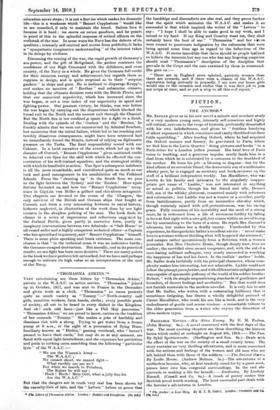FICTION.
THE ANCHOR.* MR. SADLER gives us in his new novel a minute and mordant study of a very modern young man, intensely self-conscious and highly self-critical, nervous to the verge of hysteria, profoundly dissatisfied with his own indefiniteness, and given to " fruitless bandying of silent argument in which conscience and vanity throbbed out their futile squabbling." After leasing Oxford, where he had acquired the Oxford manner and fluency, he gravitated to Paris, where we find him in the Latin Quarter " doing pictures and books " in a Paris letter for a London yellow journal. His brief love of Paris turns to loathing, and a generous impulse nearly lands him in a duel from which he is extricated by a summons to the deathbed of his mother. He loses his job—a blessing in disguise—but by the kind offices of an eccentric friend, the democratic son of a millionaire whisky peer, he is engaged as secretary and book-reviewer on the staff of a brilliant independent weekly. Ian Macallister, who was known to his family and intimates by the singularly inappro- priate pet name of " Laddie," was not interested in anything so actual as politics, though his fat friend and ally, Dermot Gill, son of the whisky plutocrat, consorted mainly with reformers and extremists ; but Laddie was not a waster or a reveller, partly from fastidiousness, partly from an instinctive chivalry which, though- curiously mixed with self-protectiveness, was his saving grace. Fully conscious of his instability and the need of a strong mate, he is redeemed from a life of strenuous futility by falling in love at first sight with a nice girl, but comes within an ace of losing her by succumbing to the lures of a siren. He repels Mrs. Certmel's advances, but makes her a deadly enemy. Unschooled by this experience, he disregards his father's excellent advice : " never make love to a woman without thinking what will happen if she returns it," and escapes rather ignominiously from a flirtation with a women journalist. But Miss Charlotte Drake, though deeply hurt, bore no malice ; the mortified siren meant vengeance, and, with the aid of a man-hating militant suffragist, very nearly succeeded in wrecking the happiness of Ian and his Janet. In the end his " anchor " holds. Mr. Sadler deals faithfully with his principal character, whose com- plexity makes him interesting, but not admirable. Laddie could not follow the precept peccafortiter, and with all his artistic enlightenment was capable of spasmodic jealousy of the world of his soldier brother Robert, " with its simple unquestioning standards of gentlemen and bounders, of decent feelings and morbidity." But that world does not furnish materials to the modern novelist. It is only fair to add that Mr. Sadler, who writes with a coruscating brilliancy that is sometimes fatiguing; has drawn a wholly delightful portrait of Canon Macallister, who reads his son like a book, and is the very embodiment of gentle and serene wisdom—a remarkable tribute to the elder generation from a writer who enjoys the dissection of ultra-modern types.


























 Previous page
Previous page